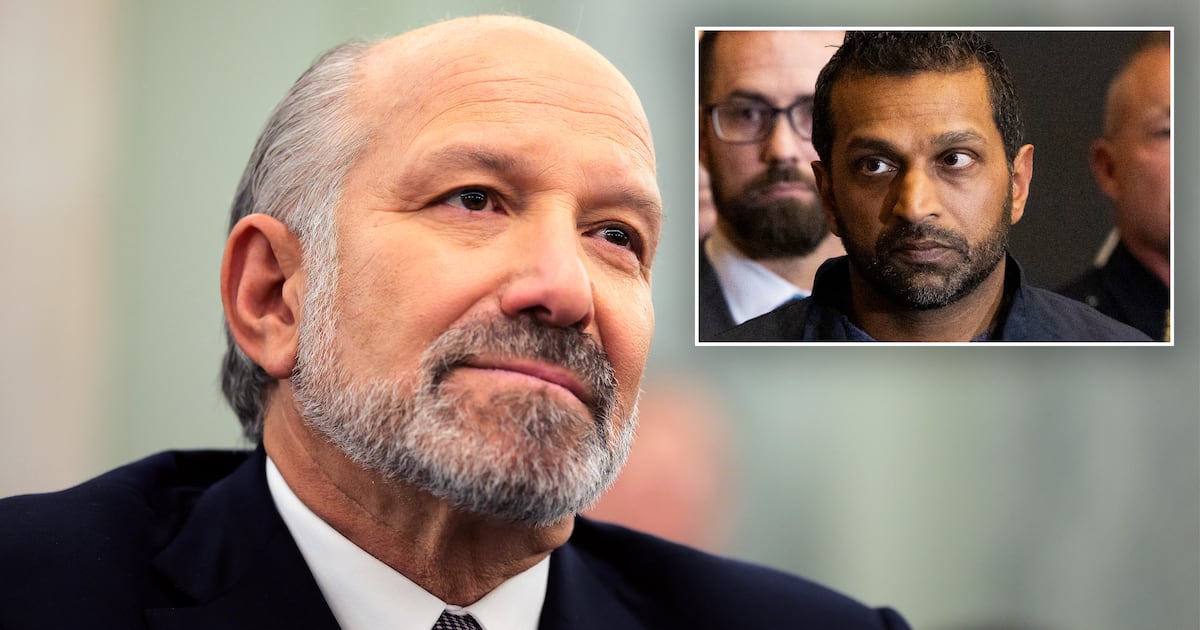In a recent podcast appearance, Commerce Secretary Howard Lutnick, a prominent ally of Donald Trump, has publicly challenged FBI Director Kash Patel’s assertion regarding Jeffrey Epstein. Lutnick claims there is substantial evidence suggesting Epstein trafficked young women to others, directly contradicting Patel’s stance. This divergence in opinion has ignited controversy, drawing attention to the complexities and unresolved questions surrounding the Epstein case.
Lutnick’s remarks, made on the New York Post’s Pod Force One podcast, not only question Patel’s assessment but also delve into Epstein’s alleged blackmailing activities. According to Lutnick, Epstein used compromising videos of his victims to manipulate and control influential figures, potentially securing his controversial 2008 plea deal. This article will dissect Lutnick’s claims, explore the reactions from Epstein’s victims, and analyze the broader implications of this high-profile dispute.
Lutnick’s Encounter with Epstein
Howard Lutnick, who once lived near Jeffrey Epstein in New York City, recounted a disturbing tour of Epstein’s Manhattan apartment. He specifically mentioned Epstein showing him and his wife the “massage room,” setting the stage for Lutnick’s subsequent allegations. This personal encounter provides a chilling backdrop to Lutnick’s claims, suggesting a deeper understanding of Epstein’s activities.
During the tour, Lutnick questioned Epstein about the massage table in his home. Epstein’s response, “Every day… And the right kind of massage,” raised Lutnick’s suspicions. He went on to suggest that some of Epstein’s high-profile associates might have been involved in activities within the massage room, further fueling the controversy surrounding Epstein’s network.
The Blackmail Allegations
Lutnick’s most explosive claim is that Epstein used hidden cameras in his massage room to film compromising videos of his victims and associates. According to Lutnick, Epstein used these videos to blackmail powerful individuals, ensuring their silence and cooperation. This assertion paints a picture of Epstein as a master manipulator who wielded blackmail as a tool for control.
“They get a massage, that’s what his M.O. was. ‘Get a massage, get a massage,’ and what happened in that massage room, I assume, was on video,” Lutnick stated. He believes that Epstein’s ability to secure a lenient 18-month sentence for soliciting a minor was likely due to trading these videos with influential people who helped him reduce his sentence.
Kash Patel’s Contradictory Stance
Lutnick’s claims directly contradict the statements made by former FBI Director Kash Patel. During a Senate Judiciary Committee hearing, Patel stated that there is “no credible information” to suggest Epstein trafficked young women to his friends or associates. Patel’s remarks have been met with skepticism and outrage, particularly from Epstein’s victims.
Patel’s assertion that he would have immediately brought a case if there were evidence of trafficking to others has been criticized as disingenuous. Critics argue that the available information, including victim testimonies, suggests otherwise. This contradiction between Lutnick and Patel has intensified the debate over the extent of Epstein’s network and its reach.
Epstein Victims’ Response
A group of Epstein’s victims issued a joint statement condemning Patel’s remarks. They expressed their confusion and dismay at his suggestion that Epstein did not traffic young women to others. The victims highlighted that even the limited publicly available information includes accounts of Epstein trafficking victims to other individuals.
The statement referenced Virginia Giuffre’s account and FBI reports documenting witness interviews in which victims named at least 20 other men they were trafficked to by Epstein and Ghislaine Maxwell. The victims’ response underscores the importance of acknowledging the full scope of Epstein’s crimes and holding all involved accountable.
The Controversial Plea Deal
Lutnick believes that Epstein’s lenient 2008 plea deal, which allowed him to avoid federal child sex offenses, was secured through the exchange of compromising videos. The deal permitted Epstein to serve an 18-month prison sentence for soliciting a minor and even allowed him to go on “work release” to his office during his sentence.
This plea deal has been a subject of intense scrutiny and criticism. Lutnick argues that such a favorable outcome for a serial sex offender could only have been achieved through some form of leverage, suggesting that Epstein traded the videos to protect himself and his associates. The circumstances surrounding the plea deal continue to raise questions about the involvement of powerful individuals in Epstein’s crimes.
Bill Gates’ Denial
Howard Lutnick alluded that Microsoft founder Bill Gates could have been one of the individuals who used Epstein’s massage room. However, Bill Gates has vehemently denied any involvement in Epstein’s illicit activities. A spokesperson for Gates stated that he only met with Epstein to discuss philanthropy and nothing else.
Gates’ denial highlights the sensitivity and high stakes involved in associating with Epstein. The allegations have had far-reaching consequences, affecting the reputations of many prominent figures. As the investigation continues, it remains crucial to separate fact from speculation and to ensure that all those involved are held accountable.
Conclusion
The conflicting views between Howard Lutnick and Kash Patel underscore the ongoing debate and unresolved questions surrounding the Jeffrey Epstein case. Lutnick’s claims of Epstein’s blackmailing activities and the alleged involvement of high-profile individuals have added a new layer of complexity to the scandal. The victims’ response and the scrutiny of Epstein’s plea deal further emphasize the need for a thorough and transparent investigation.
As the legal proceedings and public discourse continue, it is essential to remain vigilant in the pursuit of justice and accountability. The Epstein case serves as a stark reminder of the importance of protecting vulnerable individuals and holding those who abuse their power responsible for their actions. The search for truth and justice must persist to ensure that the full extent of Epstein’s crimes is brought to light.

Leave a Reply